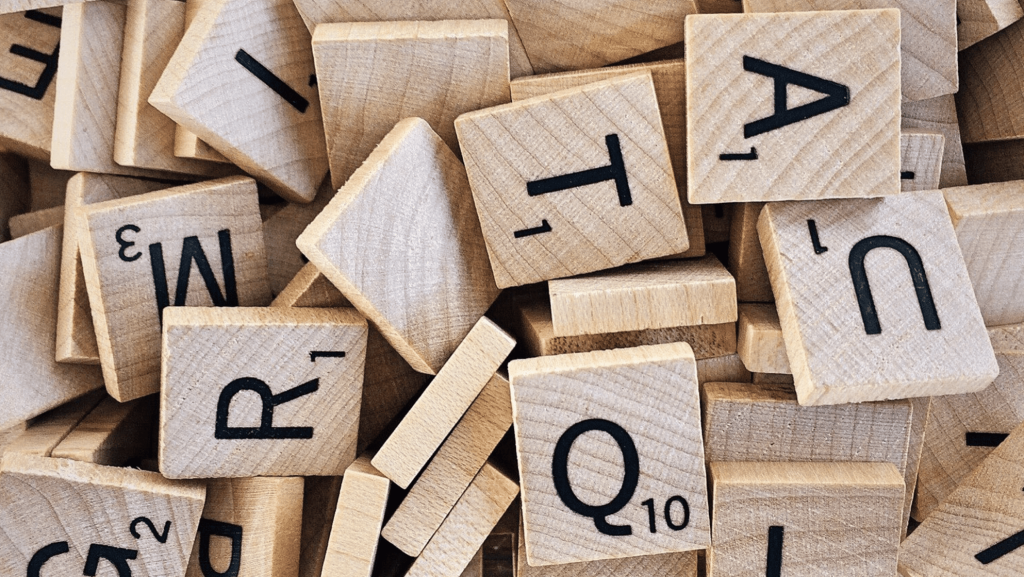Scrabble is by far one of the longest (and best) running board games globally. It all started in 1938 when Alfred Butts invented a game he called Lexiko. Since then, this game has taken on many forms and rules. Over its 81-year existence, it has become a globally beloved game, which has allowed the development of a whole system tournament level competitions.
But you don’t have to be a vocabulary super-genius to win. All you need is a competitive strategy and a few tips to beat your challenger.
Here are the top tips to make you competitive in Scrabble, so you can earn those family bragging rights.
11. Scrabble tiles in tournaments are different than home play.

Photo Credit: Pexels, Suzy Hazelwood
Scrabble tournaments forbid tiles that are engraved. World-renowned players have the ability to feel the tiles, like braille, as they draw them. This gives them an advantage. Therefore, the “official” rules state that the tiles be glossy and flat.
David Koenig, a professional Scrabble player ranked in the top 10 in North America, told Readers Digest, “Players could braille the letters or at least know when they are drawing a blank.”
10. Balance your rack with good letters
This may seem difficult when pulling random tiles puts a damper on gaining a good blend of vowels and consonants. But Richard Silberg, a tournament player, insists this works. “Most people mistakenly think a good vocabulary is needed. Actually, the skill is trying to score well and balance your rack.”
To balance, save a mix of vowels and consonants to help you on your next move. Basically, players must think ahead. Here’s an example: if you have “ACKRSTU,” you could play ‘track,’ ‘truck,’ or ‘struck.’ Silberg advises to play “truck,” as “the ‘A’ is more desirable than the ‘U’. And the ‘S’? Save this for a great move down the line.
9. Know the foreign language rules.

Photo Credit: Pixabay
According to Scrabble rules: Before the game begins, all players should agree upon the dictionary that they will use, in case of a challenge. All words labeled as a part of speech (including those listed of foreign origin, and as archaic, obsolete, colloquial, slang, etc.) are permitted with the exception of the following: words always capitalized, abbreviations, prefixes and suffixes standing alone, words requiring a hyphen or an apostrophe
8. BINGO!
While you would never shout BINGO! during a Scrabble game, the concept is the same. If you play all seven tiles in one turn, you get an extra 50 points! That’s in addition to tallying the tile points.
7. Celebrate if you snagged a “Q”, it could be worth a lot of points

Photo Credit: Pixabay
Koenig expresses that “qi” is the most important word in Scrabble (pronounced chi, it means “life force” in Chinese). Most players hang onto the “Q” because they think they must wait around for its partner the “U,” but that’s not the case. Get rid of this high scoring tile as soon as you can, ideally placing to it in two words at once. And if you also have an “S,” “qis” can be made plural for extra points.
6. Play words with NO vowels
Yes, these little gems do exist. According to the Official Scrabble Dictionary, words like hm, sh, mm are actually legal. And don’t forget about bigger words like rhythm, sphynx, or tryst. Up your game by studying the amazing non-vowel words the English dictionary has available.
5. Don’t shy away from two-letter words
There are times when you have mostly vowels on your rack, and you may find you can’t lay a single word. Don’t fret. Two-letter words exist past “to” or “or”. According to the Scrabble online there are 101 two-letter words you can play in a pinch.
4. You can “pass” on your turn

Photo Credit: Unsplash, Brett Jordan
This may seem like Scrabble suicide, but it’s an option. For example, if you have the perfect word, with nowhere to play it, you may want to pass instead of exchanging your tiles altogether. This can be a good strategy, but be careful. If there are six consecutive “passes” on the board, the game is over.
3. Don’t “coffee-house”

Photo Credit: Unsplash, Moritz Schmidt
Apparently, this is a term. “Coffee-housing” during tournament play includes cracking your knuckles, coughing or doing anything that might distract your challenger. Play fair and allow your challenger to take their turn in peace.
2. Tournaments have special rules
If an opponent plays a word and the other person thinks it’s not a word, they can challenge it. If the word is valid, no turn is lost. Instead, the challenged player gets five extra points!
1. Double Challenge versus Dingle Challenge
Of course, there are other potential rules for challenges, such as a Double Challenge. This means that if an opponent is challenged and loses, they lose a turn and must recollect the tiles laid. A Dingle Challenge is the same concept, however, the challenged player is not penalized the first time it occurs.
No matter if you are a world-renowned Scrabble player or a person that loves to play at home, these strategies can up your game. Of course, all homes have house rules, so before initiating some of these, make your opponents aware.
It will save you some arguments later.






